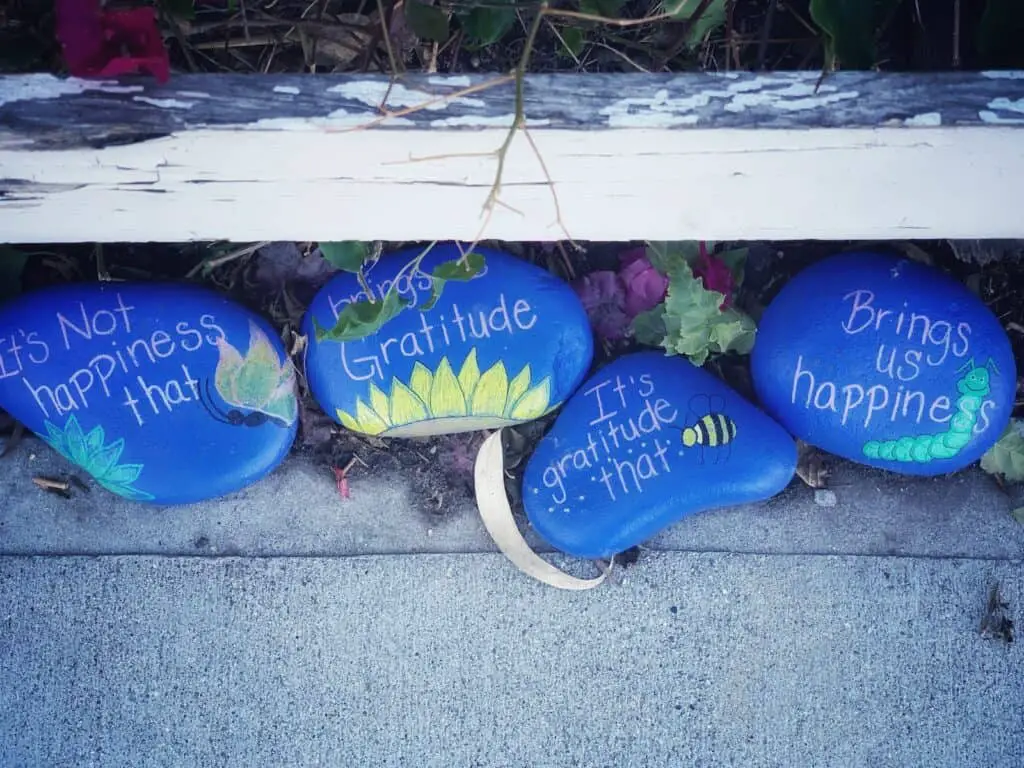In today’s fast-paced world, people are often chasing after happiness, searching for ways to bring more joy and positivity into their lives. One powerful and often underestimated way to do this is through gratitude; a simple practice of acknowledging and appreciating what we have, rather than focusing on what we lack. As they say, “gratitude turns what we have into enough.” But can gratitude make you happy? In this blog post, we will explore the effects of gratitude on happiness and well-being, backed by positive psychology research, and discuss how to effectively cultivate gratitude for a more fulfilled life.
Understanding Gratitude

Gratitude, derived from the Latin word “gratia”, means grace, graciousness, or gratefulness. It is a multifaceted emotion that involves the recognition and appreciation of the positive things, people, and experiences in our lives. Gratitude can be expressed through simple acts of kindness, such as saying “thank you” or writing a thank-you note, or it can manifest as an overall sense of well-being and contentment, such as feeling fortunate for one’s health, relationships, and other life circumstances.
The Science Behind Gratitude and Happiness

As the field of positive psychology has grown over the past decade, researchers have become increasingly interested in the relationship between gratitude and happiness. Several studies suggest that gratitude is strongly correlated with well-being, and there is a definite link between the two concepts. Some key insights from the literature include the following findings:
1. The Positive Impact of Gratitude on Mental Health
Gratitude has been found to improve mental health by reducing negative emotions and increasing positive emotions. In a study published in Psychological Science, participants who were instructed to focus on aspects of their lives they were grateful for demonstrated improvements in overall mental health and well-being, as compared to those who focused on their complaints or neutral events.
2. Gratitude as a Buffer against Negative Life Experiences
Research has shown that expressing gratitude can help individuals cope with stress, anxiety, and depression, by shifting their focus from negative feelings and thoughts to more positive emotions and experiences. Grateful thinking has been found to promote resilience and self-worth, which in turn can enhance one’s overall well-being.
3. Gratitude and Physical Health
Practicing gratitude has also been shown to have a positive effect on physical well-being. According to Harvard Health Publishing, an affiliate of Harvard Medical School, people who practice gratitude consistently report fewer physical complaints, are more likely to exercise, and have stronger immune systems.
4. Gratitude and Relationships
Gratitude has been found to improve interpersonal relationships by fostering a sense of connectedness and social support. This is because gratitude helps individuals feel more positive about themselves and others, which in turn encourages the development of strong social bonds.
5. Gratitude and Life Satisfaction
Gratitude has been linked to greater life satisfaction, as it encourages individuals to focus on the positive aspects of their lives, rather than dwelling on the negative. A recent study published in the Journal of Social Psychology found that gratitude is strongly associated with life satisfaction, and that this relationship is partially mediated by positive experiences, social bonds, and emotional experiences.
These findings collectively suggest that cultivating gratitude can indeed lead to greater happiness, with a multitude of benefits extending well beyond just mental health.
How to Cultivate Gratitude
Now that we understand the substantial impact that gratitude can have on our well-being, let’s explore different ways to cultivate this powerful emotion in our daily lives:
1. Gratitude Journal

One popular and effective method for cultivating gratitude is to maintain a gratitude journal. This involves writing down a few things or experiences that you are grateful for each day, which can help shift your focus from negative emotions and stressors to positive events and emotions. To start a gratitude journal, try setting aside a specific time each day to write down three to five things you are grateful for, and aim to include details that make each entry unique and meaningful.
2. Mindfulness and Meditation
Practicing mindfulness and meditation can help you cultivate an attitude of gratitude by training your mind to focus on the present moment and savor positive experiences. Mindfulness practices, such as deep breathing, visualization, or guided meditations, can help you develop a greater sense of awareness and appreciation for the many blessings in your life.
3. Expressing Gratitude to Others
Another way to cultivate gratitude is to make a conscious effort to express gratitude to the people in your life, whether it’s through a simple “thank you,” a heartfelt thank you letter, or a small act of kindness. Not only will this make the other person feel valued and cared for, but it will also reinforce your own feelings of gratitude.
Gratitude and Well-being Together
The many positive benefits of gratitude extend beyond just mental health, as practicing gratitude can also positively impact one’s emotional, physical, and social well-being:
1. Reducing Stress
Gratitude has been found to reduce stress by promoting a more positive outlook on life. By focusing on the things we are grateful for, we are better able to manage stressful situations and maintain a sense of calm and balance.
2. Improving Sleep
Research has shown that people who practice gratitude tend to enjoy better sleep quality, as they are less likely to worry and ruminate over negative thoughts before bedtime. By focusing on positive experiences and emotions, we are more likely to create a soothing mental environment that is conducive to restful sleep.
3. Strengthening Relationships
As mentioned earlier, expressing gratitude to others can help enhance our interpersonal connections by fostering a sense of belonging and mutual appreciation. This can result in stronger relationships and a greater sense of fulfilment from our social support networks.
By integrating gratitude into various aspects of our lives, we can maximize the positive impact it has on our overall well-being.
Gratitude and the Pursuit of Happiness

While the research clearly supports the association between gratitude and happiness, it is important to recognize that gratitude is not a one-time activity or a quick fix for unhappiness. Rather, it is an ongoing practice and a lifelong journey that requires dedication and effort. Here are some tips for maintaining a consistent gratitude practice:
1. Be Patient and Persistent
Cultivating gratitude can take time, and it may not come naturally at first. Be patient with yourself, and don’t give up. The more you practice gratitude, the more it will become ingrained in your everyday thoughts and actions.
2. Make Gratitude a Habit
Set aside a specific time each day for gratitude reflection, whether it be through journaling, meditation, or simply taking a few moments to mentally review the things you’re grateful for. Consistency is key in creating long-lasting changes in our thought patterns and behaviors.
3. Seek Out Gratitude Reminders
Surround yourself with visual or auditory reminders of the things you’re grateful for, such as photographs, quotes, or even a gratitude jar filled with notes detailing your blessings. This will help reinforce the importance of gratitude in your daily life.
4. Practice Gratitude
During AdversityIt can be especially challenging to practice gratitude during trying times; however, it is during these difficult moments that gratitude can be particularly powerful in helping us cope with stress and negative emotions. When faced with adversity, try to shift your focus from the negative aspects of the situation to the positive lessons or opportunities for growth.
By consistently focusing on the positive benefits of gratitude and incorporating it into our daily lives, we can experience lasting improvements in our overall happiness and well-being.
Real-Life Examples and Stories
To further illustrate the power of gratitude in bolstering happiness, let’s explore some real -life examples and stories from people who have transformed their lives through the practice of gratitude:
1. Overcoming Mental Health Issues
Sarah, a woman who struggled with anxiety and depression for years, began incorporating gratitude journaling and meditation into her daily routine. Over time, her mental health improved significantly, and she felt a renewed sense of joy and positivity in her life.
2. Healing from Grief and Loss
After losing her husband to a tragic accident, Jane found solace in expressing gratitude for the time they shared together and the positive memories they created. Through practicing gratitude, Jane was able to cope with her grief and find meaning in her loss, ultimately re-embracing life with newfound strength and resilience.
3. Strengthening Relationships
Tom, who often struggled with maintaining strong relationships, made a conscious effort to express gratitude for the support and kindness of his friends and family. This simple shift in mindset not only improved his relationships but also boosted his self-esteem and sense of self-worth.
4. Testimonies of Mental Health Professionals
Many therapists and mental health professionals have witnessed the profound impact of gratitude on happiness and well-being in their clients. They report that clients who practice gratitude consistently are better able to cope with stress, maintain a more positive outlook on life, and develop stronger relationships with others.
By drawing inspiration from these real-life examples, we can see that practicing gratitude can lead to profound transformations in one’s happiness, mental health, relationships, and overall well-being.
Final Thoughts: Can Gratitude Make You Happy?
In conclusion, the answer to the question “Can gratitude make you happy?” is a resounding “Yes!” There is a wealth of scientific evidence and anecdotal testimony that supports the link between gratitude and happiness. By adopting simple practices such as gratitude journaling, mindfulness meditation, and expressing gratitude to others, we can cultivate more gratitude and experience more positive emotions in our lives.
Gratitude not only helps to boost our mental health but also extends its positive effects to various aspects of our well-being, including physical health, sleep quality, stress management, and relationship strength. Though cultivating gratitude is an ongoing practice and not a shortcut to happiness, the benefits of consistently practicing gratitude are well worth the effort.
As we move forward in our pursuit of happiness and well-being, let us remember to cherish the many blessings in our lives and to express gratitude for all that we have. By doing so, we can truly experience the profound power of gratitude in boosting our happiness and elevating the quality of our lives.
Other suggested articles:

